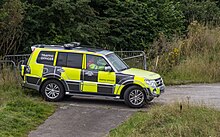Law enforcement in the United Kingdom
[8] The first centrally organised police force in the world was created in Ireland, then a part of the United Kingdom, following the Peace Preservation Act in 1814 for which Sir Robert Peel was largely responsible.[16] Other historians, such as Robert Storch, David Philips and Roger Swift, argue that Peel's Metropolitan Police were built on his experience of the Royal Irish Constabulary.There is extensive documentation of police brutality in the 19th century, including excessive force, racial profiling, and several charges of murder.This grants the officer all the powers and privileges, duties and responsibilities of a constable in one of the three distinct legal systems - either England and Wales, Scotland or Northern Ireland, and the territorial waters of that country.Under Article 18 of the Ministry of Housing and Local Government Provisional Order Confirmation (Greater London Parks and Open Spaces) Act 1967, London Borough Councils are allowed to swear in council officers as constables for "securing the observance of the provisions of all enactments relating to open spaces under their control or management and of bye-laws and regulations made thereunder".In England and Wales, the vast majority of attested constables enjoy full powers of arrest and search as granted by the Police and Criminal Evidence Act 1984.Although police officers have wide-ranging powers, they are still subject to the same laws as members of the public (aside from specific exemptions such as the carrying of firearms and certain road traffic legislation).There are additional legal restrictions placed on police officers such as the prohibitions on industrial action and on taking part in active politics.In 1981 James Anderton, Chief Constable of Greater Manchester Police, called for the number of forces to be reduced to nine in England (one for each Region) and one for Wales.When executing a warrant issued in England & Wales or Northern Ireland, a constable may use reasonable force and has specified search powers provided by section 139 of the Criminal Justice and Public Order Act 1994.[111] Every territorial force has a specialist Firearms Unit,[112] which maintains armed response vehicles to respond to firearms-related emergency calls.Metropolitan and City of London Police operate with three officers per armed response vehicle, composed of a driver, a navigator, and an observer who gathers information about the incident and liaises with other units.Officers who have undergone additional training to reach 'initial pursuit phase' standard are allowed to pursue vehicles, should they fail to stop.Roads Policing Units (RPU) utilise performance vehicles to primarily enforce traffic laws and pursue fleeing suspects.Tactical/operational support units use larger vans, equipped with windscreen cages and/or reinforced glass, to transport officers into public order situations.Similarly, some roads policing vehicles and ARVs are unmarked to help officers identity offences and use pre-emptive tactics to stop a suspect fleeing.Derived from the IPLDP and although not linked to a formal qualification as such; IL4SC requires the learning outcomes and National Occupational Standards (NOSs) are met in order to become compliant.Successfully completion of the PCSO NLP over a period of six months to a year will result in a non-mandatory Certificate in Policing and this equates to 10 weeks of direct learning and consists of six mandatory units."[121] Within months of this, the Home Secretary revealed (in a 16-page response to a report by Lord Carlile, the independent reviewer of UK terrorism legislation) that the Home Office would issue a Green Paper proposing to take forward proposals by the Association of Chief Police Officers (England & Wales) for the establishment of a new 3,000-strong national border police force to work alongside the Agency.[160] The Macpherson Report coined the phrase "institutionalised racism" to describe policies and procedures that adversely affect persons from ethnic minority groups after the death of Stephen Lawrence.[172] PITO are also planning to use CCTV facial recognition systems to identify known suspects; a future link to the proposed National Identity Register has been suggested by some.In December 2005, author Lynette Burrows was interviewed by police after expressing her opinion on BBC Radio 5 Live that homosexuals should not be allowed to adopt children.[175] Section 76 of the Counter-Terrorism Act 2008 came into force on 15 February 2009[176] making it an offence to elicit, attempt to elicit, or publish information "...of a kind likely to be useful to a person committing or preparing an act of terrorism" about:[177] a member of His Majesty's Armed Forces; a constable, the Security Service, the Secret Intelligence Service, or Government Communications Headquarters.[189] In response to the concerns, the Chief Inspector of Constabulary, Denis O'Connor, published a 150-page report in November 2009 that aimed to restore Britain's consent-based model of policing.[190] During 2010 and 2011, it emerged that, while engaged in covert infiltration of protest groups, undercover police officers had entered into intimate relationships with a number of people on false pretences and under assumed aliases, in some cases sharing a home, making plans for weddings, or fathering children, only to vanish after some years when their role was complete.In November 2015 the Metropolitan Police published an unreserved apology in which it exonerated and apologised to those women who had been deceived and stated the methodology had constituted abuse and a "gross violation" with severely harmful effects, as part of a settlement of their cases.[192] Prior to Brexit there were concerns that the UK may lose access to important cross border databases of criminals, which would make it harder for the police to keep the public safe.[199][200] Conservative former Home Secretary Priti Patel called Farage's comments deeply misleading and "simply not relevant right now".She told Times Radio: "There's a clear difference between effectively blocking streets or roads being closed to burning down libraries, hotels, food banks and attacking places of worship.[204] Mike Neville, a retired Scotland Yard detective chief inspector described the 2024 Notting Hill Carnival, a celebration of Afro-Caribbean culture, as the "ultimate example of two-tier policing", and that if the same disorderly behaviour was replicated at football matches or elsewhere it would be banned.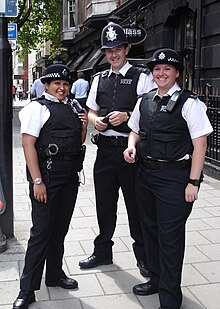
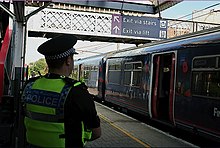



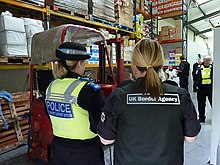
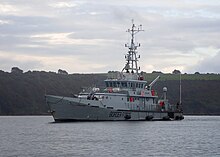
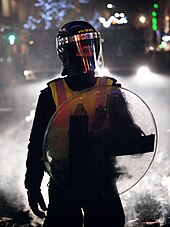
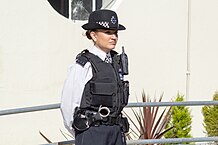
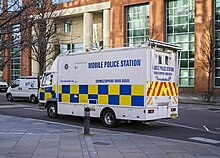

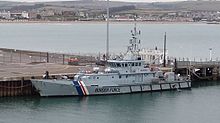

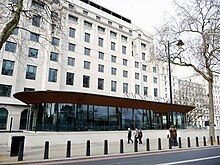










































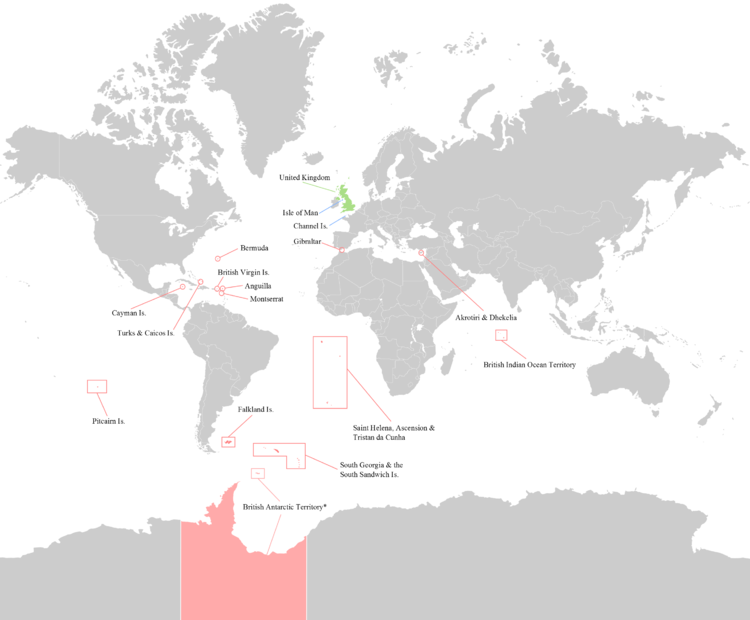
British Overseas Territories
United Kingdom
Metropolitan PoliceBritish Transport Policepolice vehicleNorfolk ConstabularyVauxhall Astrabattenburg markingsCourtsPrisonsAgenciespolice forcesdefunctFirearms useHistoryAviationFirearmsUniform and equipmentVehiclesAccredited personCertified enforcement agentCivil enforcement officerCivilian enforcement officermagistrates' bailiffsSpecial ConstabularyChief constableCourt security officerCounty court bailiffCustody officerHigh Court enforcement officerTraffic officerNational Crime Agency (officer)National Highways traffic officerPolice community support officerPolice custody and security officerPrison officerTraffic wardenWater bailiffChief police officerPolice and crime commissionerEmergency control centreHome OfficeNeighbourhood policing teamsPolice areaPolice authorityInitial Police Learning and Development ProgrammePolice cadetsPolice Federation of England and WalesPolice Federation for Northern IrelandScottish Police FederationPolice Information PointPolice OathEngland and WalesScotlandPolice Support VolunteerScotland YardPolice 101 numberPolicing by consentWarrant cardHighway Act 1835Police Act 1964Police (Scotland) Act 1967Immigration Act 1971Misuse of Drugs Act 1971Salmon & Freshwater Fisheries Act 1975Police and Criminal Evidence Act 1984Road Traffic Regulation Act 1984Road Traffic Act 1988Environmental Protection Act 1990Criminal Justice and Public Order Act 1994Police Act 1996Confiscation of Alcohol (Young Persons) Act 1997Terrorism Act 2000Criminal Justice and Police Act 2001Police Reform Act 2002Anti-social Behaviour Act 2003Crime and Courts Act 2013Licensing Act 2003Railways and Transport Safety Act 2003Clean Neighbourhoods and Environment Act 2005Serious Organised Crime and Police Act 2005Police Reform and Social Responsibility Act 2011Anti-Social Behaviour, Crime and Policing Act 2014Policing and Crime Act 2017Police and Criminal Evidence (Northern Ireland) Order 1989TerrorismNorthern Irelandlaw enforcementpolice constablesterritorial police forceone in Scotlandone in Northern IrelandMinistry of Defence PoliceCivil Nuclear Constabularyspecialist policingNational Crime Agencyorganised crimeFederal Bureau of InvestigationUnited StatesaccountabilityHistory of law enforcement in the United KingdomCity of Glasgow PoliceSir Robert PeelMetropolitan Police Act 1829Peelian principlespolice brutalityFlying SquadOperation CountrymanPolice Complaints BoardScarman ReportWest Midlands Serious Crime SquadBirmingham SixPolice Complaints AuthorityIndependent Police Complaints CommissionIndependent Office for Police ConductPowers of the police in the United Kingdom (disambiguation)territorial police forceschemical protective equipmentPortsmouth Harbourspecial police forces2005 G8 summitHarbours, Docks, and Piers Clauses Act 1847Port of Tilbury PolicePort of London Act 1968Mersey Tunnels PoliceEpping Forest KeepersEpping Forest Act 1878Royal Borough of Kensington and Chelsea Parks Police

